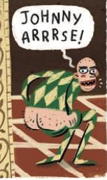|
It seems like this forum would have plenty of people who shared my love of mystery fiction, so the only thing stopping a mystery thread from existing was the effort involved in making one. This minimal effort I have at last put forth. I love mystery stories, the more classical and mannered the better. If you're looking for a mystery story, well, the most popular answer would be to start with one of the Four Queens of Crime:
I could make a bunch of categories and compare and contrast the different styles of mystery, but for now I'm just going to make a list of a few of the ones I like best, and of whom you may not have heard.
Anyway, there's also plenty of other genres, including the more modern policemanly mystery, but I don't like them as much so I will leave the detailed guide on those to somebody else! Rand Brittain fucked around with this message at 23:09 on Aug 6, 2023 |
|
|
|

|
| # ? Apr 23, 2024 21:57 |
|
I will one day become a murder mystery detective, but the nice ones not the evil cop ones. I need to read more Sayers, I just never got around to it.
|
|
|
|
Along with authors already mentioned, I like Tony Hillerman, too. He does such a good job handling the different cultures and cultural conflicts. Also a fan of Robert van Gulick, mostly because I have an interest in the T'ang dynasty.
|
|
|
xcheopis posted:Also a fan of Robert van Gulick, mostly because I have an interest in the T'ang dynasty. Anyhow, my favorite currently writing crime fiction author is Fred Vargas; she does a sort of a mix of murder mystery and police procedural sometimes leaning towards one or the other a bit more. Probably her biggest draw is the quirky characters she populates her books with. The books form a vague timeline, but the best starting points are either The Chalk Circle Man or The Three Evangelists. Anyway, lots of authors I never heard of there; definitely will look some of them up.
|
|
|
|
|
I love historical fiction, non-cop mysteries, and female protagonists. So I read a lot, a lot of cozy mystery novels. Cozies are mysteries that are usually not as violent or gritty as your usual mystery-detective-crime drama book, typically involve a detective who is not a professional (and often a woman), and a lot of nosy busybody gossiping to solve a crime. You'd probably recognize authors Rita Mae Brown and Lillian Jackson Braun (especially Braun), and of course Agatha Christie and Miss Marple. Also they're usually themed, like the main character is a baker or owns a bookstore and gets involved with the mysteries via their occupation or hobby. But like I said, I usually only read the historical fiction ones so here's a big list of names; Kerry Greenwood writes the Phryne Fisher, Delphic Women, and Corinna Chapman series, along with some other non-mystery stuff. Phryne Fisher is probably better known as a tv show, but it's probably one of my more favorite historical series, just because Kerry Greenwood has a really great attention to detail that I don't find in every series. If you like really sumptuous descriptions of clothing, food, and Australia in 1928, this is a good series to read. The mysteries themselves are pretty entertaining, barring a few (Murder and Mendelssohn is Sherlock fanfiction, Blood and Circuses I just did not care for), and Phryne is a really fun, badass protagonist. I think this is probably the most 'mature' cozy series I read. Carola Dunn writes the Daisy Dalrymple series, which also takes place in the 1920s, but in England. Lots of country house party murders and aristocrats being turds, overall it's just a pretty decent series. You get what you expect. Rhys Bowen writes Her Royal Spyness, Constable Evans, and Molly Murphy, along with some standalone WW2 books. Her Royal Spyness is a more comedy-oriented series and it's...it's not very good but I've read them all anyway. Taking place in 1930s England (and sometimes Europe), Her Royal Spyness features a very minor royal cousin and involves royal intrigue, sometimes murder, and lots and lots of repeated jokes. Molly Murphy stars an Irish immigrant to New York in the 1900s, who also is on the run because she killed a guy in Ireland, although I've only read the first one so I can't say how the rest follow. Her ww2 novel, In Farleigh Field, is quite good, though! Marion Chesney I have a big loving problem with, but she gets recommended a lot so I'll comment. She writes the Edwardian Murder Mystery series, among others. She does like to include a lot of historical detail, which is nice, but she often includes it at the expense of the story and it usually feels more like wikipedia facts copy and pasted into a novel. The mysteries are usually really lacking and feel tacked on to the thing she really wants to write, which is relationship drama, which I don't feel is well-written, either! Yet I still read all four Edwardian Murder Mysteries. She also writes mysteries as M.C Beaton, including the Agatha Raisin and Hamish Macbeth series, which I haven't read and might be better! Frances Brody writes the Kate Shackleton series, also set in 1920s England, and are a bit more mature in tone than Dunn or Bowen's work, probably just because Kate is a more mature character. I haven't read much in this series, but I really enjoy it. Brody seems to write communities very well, and her setting writing is very nice. And while not a cozy author, I have to mention Ruth Rendell, who writes the Inspector Wexford series, along with a bunch of standalones. Since I've still only read her first novel (From Doon With Death), I can't say how all her stuff holds up...but From Doon with Death is a really phenomenal book that actually made me say 'oh holy poo poo' at the end. Thanks OP for your big ol' list, too, E. C. R. Lorac sounds completely my poo poo.
|
|
|
|
Great recs, thanks!
|
|
|
|
It always seems weird to me that the modern heavily-themed baking/crossword/bookshop/cats mystery gets made into a category with extremely elderly stuff like Miss Marple, but I suppose they do basically share an audience. (It mostly annoys me because my attempts to find audiobooks of old stuff inevitably lead me to fifty books publishing last year about the Sudoku Murder Mysteries, but I try not to complain to hard because sexism is probably involved.)
|
|
|
|
What do you think of Alexander McCall Smith? I have the first few books in his "No. 1 Ladies Detective Agency" and enjoyed them well enough. Just not enough to continue the series!
|
|
|
|
im reading the woman in white and i dont like it as much as i liked the moonstone. i also played the return of the obra dinn which is basically a book imo and is 10x better than any mystery ive read for ages
|
|
|
|
it took wilkie collins 8 years to realise that guy who is horny for women is a much less interesting opening character than guy who is horny for robinson crusoe
|
|
|
|
Snooze Cruise posted:I will one day become a murder mystery detective, but the nice ones not the evil cop ones. Orwell wrote an interesting essay on the moral decline of crime fiction, from private detectives as protagonists to the evil cop ones to gangsters as protagonists: http://www.orwell.ru/library/reviews/chase/english/e_bland
|
|
|
|
I just cannot understand the appeal of Agatha Christie. The characters are boring, the plots/solutions are ludicrous, and the prose is journeyman. In a just world, it would be Sayers that was the top femme crime writer in everyone’s minds.
|
|
|
poisonpill posted:I just cannot understand the appeal of Agatha Christie. The characters are boring, the plots/solutions are ludicrous, and the prose is journeyman. In a just world, it would be Sayers that was the top femme crime writer in everyone’s minds.
|
|
|
|
|
anilEhilated posted:With Christie, the reader can usually figure out whodunit themselves. Sayers' clues often get utterly ridiculous (and there's a reason why people don't remember most of the books - Murder Must Advertise is great but then it's steep climb downhill - and I'm saying that as someone who enjoys The Nine Tailors). Well, I enjoyed Gaudy Night even if nobody else did. Meanwhile, I've been reading Patricia Moyes' Murder Fantastical, and dang, it turns out she's pretty good! I'll report on this later and possibly add her to the big list.
|
|
|
|
Nine Tailors is funny, people who like it say it’s approaching real literature and people that hate it say it’s boring and makes no sense. I love the atmosphere and the setting and the resolution is pretty wild so it’s worth grabbing. I’m hoping the first Wimsey book will be the book of the month sometime this year, since it just made it to the public domain in the US.
|
|
|
|
A Wimsey book of the month would be neat, but Whose Body? is honestly not that great.
|
|
|
|
I recently read Murder on the Leviathan by Boris Akunin. It was good! A solid plot, reminiscent of Agatha Christie*, but with frankly better prose and characterization than Christie. I had a good idea of who the murderer was by around page 140; maybe that just shows that I've gotten better at reading murder mysteries lately rather than a weakness in the construction of the plot, but arguably it's a side effect of the characterization actually being too good. Even then, though, there were some major twists that took me by surprise but were still essentially fair. Apparently Akunin wrote a bunch of other mysteries featuring Erast Fandorin, although every book in the series supposedly belongs to a different mystery sub-genre, so the others are likely to be very different. I'm still likely to try them anyway. * At least, the basic setup of the fixed number of suspects from different countries together on the boat is reminiscent of Murder of the Orient Express or Death on the Nile, but opening the story with 10 corpses, including 2 children, before they get on the boat is a decidedly un-Christie touch. To be clear, this isn't actually a particularly gory or sadistic book; it just has a high body count.
|
|
|
|
I'm working my way through the anthology collections of Brother Cadfael by Edith Pargeter (under the pen name Ellis Peters) which I think might be up some of y'all's alleys. I'm at work so I can't get in to much detail about the series but it can be summed up as "Benedictine Monk in the early 12th Century solves crimes by actually being able to use deductive reasoning". It's relatively grounded with a keen focus on period appropriate thoughts and politics - Cadfael's able to do what he does not necessarily because there's anything intrinsically special about him but that he's lived an active life in the secular world experiencing things before taking his vows and getting further education. There's a BBC TV series out there staring Derek Jacobi as well!
|
|
|
|
I'm going back through and re-reading the Nero Wolfe books in order, something I hadn't done in a long time. It's an interesting exercise and I really recommend it to anyone who's a fan of mystery fiction. Rex Stout wrote over forty five Nero Wolfe books, one per year, every year, starting in the 1930's and ending in the 70's. Each one set in the year of publication and (generally) in Manhattan. The result, largely accidental, is that as the series progresses you get a really interesting year by year depiction of American life. The books start out with a lot of casual racism, which gets called out and pushed out year by year (casual sexism, too, which there's a lot less authorial pushback on); in the early books, it's depression era, so a single dollar is an effective bribe; the fees Wolfe commands escalate and escalate; World War Two causes all kinds of shifts; in the 1960's there are hippies; etc. You can get the same effect by reading the Travis McGee series but you end up with a picture of coastal Florida from the fifties to the seventies, which isn't quite as interesting. What I'm noticing in particular on this re-read is just how much time Archie spends making it clear that he's not gay. Not gay at all, no, nosiree, just live with another dude, no ladies here, just cool bros doing bro stuff Hieronymous Alloy fucked around with this message at 18:15 on Mar 7, 2019 |
|
|
|
|
Hieronymous Alloy posted:What I'm noticing in particular on this re-read is just how much time Archie spends making it clear that he's not gay. Not gay at all, no, nosiree, just live with another dude, no ladies here, just cool bros doing bro stuff I mostly tended to read it as a father-and-son relationship, except that they're both emotionally incompetent and can't admit to their feeling for each other. The really interesting question, to me, would be how to continue the exercise and extend Wolfe into 2019. How would that work? Would Archie carry Wolfe around in an iPad to teleconference with people, or would Wolfe just refuse to deal with technology as part of his complicated series of life rules? (I could actually see him not countenancing cellular phones because expecting people to be available 24/7 is an intolerable incursion onto the privacy of the individual.)
|
|
|
Rand Brittain posted:I mostly tended to read it as a father-and-son relationship, except that they're both emotionally incompetent and can't admit to their feeling for each other. There actually is a dude writing Nero Wolfe novels currently, licensed off the estate: quote:
I haven't read them but I admit to a certain amount of morbid curiosity on exactly those points. I can imagine Wolfe yelling at Archie through an Ipad, ordering him to point the pad at various things so Wolfe can see them.
|
|
|
|
|
Yeah, they don't follow the sliding timeline, though; they're still set in the past. (Heck, they aren't even set after the last book Stout published, because in the one I just peered into the preview for, Marko Vukcic is still alive.) EDIT: Oh, wait, it looks like there's a sequel series and a prequel series. Well, that's not confusing at all. Plus, the first series looks to have come out before cell phones, which would be the game-changer. Rand Brittain fucked around with this message at 22:29 on Mar 7, 2019 |
|
|
|
I can't imagine Wolfe ever using a tablet or webcam. The whole point of his rule about not leaving the house on business is to ensure that you have to come to him on his terms. Peering out at the world through FaceTime seems far too undignified, and as Rand says, there's no way Wolfe would ever tolerate anyone assuming he was on call all the time. I've read a couple of the 80s-90s Goldsborough books, and they were, well, okay. The Wolfe books are so formulaic that I don't think it's too hard to write a serviceable pastiche; the real magic is in the dialogue and the relationship between Wolfe and Archie, and that's a lot harder to imitate.
|
|
|
|
Wolfe doesn't even like using the phone, no way he has the patience to fiddle with a tablet. I've read all the Stout books, and like... two of Goldsborough. They check all the boxes for a description of a Wolfe story, and come up short because no one but Rex Stout is Rex Stout. Like Selachian says, it doesn't matter how many times the mystery gets solved off-page by some errand Wolfe has Saul on, the Wolfe/Archie interaction is what makes the stories. One of my favorite examples of both the sliding timeline and how fundamental that relationship is to the books is in A Right to Die, where Archie and Wolfe are testing each other on who remembered what about someone they met on a case that is explicitly called out as having happened decades earlier in one of the first books. The character from the earlier story has aged appropriately, the times have changed from depression era to the civil rights struggle, and absolutely no explanation is given for why Archie and Wolfe have not aged while the whole plot is framed around the fact the other character has. It's great.
|
|
|
|
I've been reading Decagon House Murders (the Japanese text), and loving it a lot so far. It's the kind of fair-play mystery that really wastes no time at all with anything not clue-related. It's a very very obvious pastiche, plot-wise, of And Then There Were None, and is clearly aimed at fans of mystery, poking the 4th wall pretty often with stuff like "dude, you are probably the killer because you invited us to this island, and the host is always the most suspicious" or "this is clearly a body-swapping gambit" which is really fun and well done. The characters also discuss suspicious events analytically basically as soon as they happen, and every single chapter leaves me satisfied with the clues and/or plot progression. I've read spoiler-free comments that the solution is amazing, so I have high hopes. And with how the novel is so aware of mystery tropes, I really have no idea where it's going right now (a bit over a third through the book). There are already soooo many moving parts to the mystery. My biggest frustration though, and it's not even with the book itself, is that the English translation is... how should I say this... abyssmal. I'm so goddamn mad because the author deserves better than this crap. Every time I open up the english kindle text to check how they translated a line, it's entirely butchered every single time. The rote meanings of the sentences are still there so I'm sure it's still possible to solve the mystery, but i'm baffled how it has favorable reviews on Amazon since it removes all of the authorial/character voice. There are lines where it's blatantly obvious to me that the translator didn't really get the line so he just paraphrased a great line into some crap he made up. And at times I think he uses weird archaic terms just to sound more like Agatha Christie or something even though the novel is written in perfectly understandable Japanese and was published in the 1980s. To be honest, even though I'd just started the novel at the time, I was thinking a bit ago about translating it properly, giving actual respect to the original text and making it actually readable, like, just for fun and a little bit of literary justice. But in the end I was like "eh, it's not worth it for a book that's already fully translated." I figured I'd just read the book and then think about translating/posting the sequel in his "Mansion" series if I like it. However, the more I've read the more I love the style, and the more I've examined of the English text the more I hate it, so my urge to rewrite has only grown. I have truly not found a redeeming quality in the English writing. That combined with the fact that I also have a huge urge to write down all these details the book is packed with, so that I remember them all, and I may be willing to actually do it. And that's where I have a question. Would something like that be of interest to this forum? Like, would people be interested in sort of trying to solve a mystery alongside me as I read and post (though I'd first have to catch up to where I am)? Or is it actually, like I suspected, stupid to do that for a book that already has a translation? Or possibly, is it stupid to do it at all? Let me know your thoughts.
|
|
|
|
If you like Ayatsuji, I would also recommend Arisugawa Arisu and (the early works of) Mori Hiroshi. (There's plenty of other good shin-honkaku but that's the three major ones I can think of that I've enjoyed.)
|
|
|
|
onsetOutsider posted:And that's where I have a question. Would something like that be of interest to this forum? Like, would people be interested in sort of trying to solve a mystery alongside me as I read and post (though I'd first have to catch up to where I am)? Or is it actually, like I suspected, stupid to do that for a book that already has a translation? Or possibly, is it stupid to do it at all? Let me know your thoughts. That actually sounds really interesting if you think you're willing to do it! I've always been interested in translation — my impression of Japanese from my experience with it is that the sentence structure is so different (and occasionally very long) that you frequently have to take more liberties than the mediocre translator is willing to do to get something that sounds natural in English. Anyway, don't underestimate the power of willingness to do something just to get something right. That's how I got into ebooking and acquired all my powers.
|
|
|
|
I just read my first Dorothy Sayers, and I think maybe Whose Body? was a bad place to start? Nothing about it really grabbed me, I kind of saw the solution coming from a mile off despite it not being that well constructed of a mystery, and while I don't dislike Wimsey, it feels like Sayers hadn't really figured out who the character was in the process of writing the book. I assume I should jump ahead to a later book if I want to get a better sense of her style? edit: also, while I know it doesn't necessarily fit in the umbrella of traditional mystery fiction, and only sort of fits into hard-boiled detective territory, I'm about halfway through Yiddish Policeman's Union and what I thought would end up being kind of a gimmicky mystery novel has turned out to be a genuinely good book all around. I'm excited to see where it goes.
|
|
|
|
MockingQuantum posted:I just read my first Dorothy Sayers, and I think maybe Whose Body? was a bad place to start? Nothing about it really grabbed me, I kind of saw the solution coming from a mile off despite it not being that well constructed of a mystery, and while I don't dislike Wimsey, it feels like Sayers hadn't really figured out who the character was in the process of writing the book. I assume I should jump ahead to a later book if I want to get a better sense of her style? You can keep going if you want but I think Sayer's claim to fame is basically being the pinnacle of the "cozy" part of "cozy mystery." Everybody's rich, everyone's glamorous, etc.. Keep in mind she's writing in the Depression so there's a large element of escapism going on. It's not so much about the actual mystery as about the escapism of being a rich Lord solvin' crimes. quote:Lord Peter's large income... I deliberately gave him... After all it cost me nothing and at the time I was particularly hard up and it gave me pleasure to spend his fortune for him. When I was dissatisfied with my single unfurnished room I took a luxurious flat for him in Piccadilly. When my cheap rug got a hole in it, I ordered him an Aubusson carpet. When I had no money to pay my bus fare I presented him with a Daimler double-six, upholstered in a style of sober magnificence, and when I felt dull I let him drive it. I can heartily recommend this inexpensive way of furnishing to all who are discontented with their incomes. It relieves the mind and does no harm to anybody. I kinda prefer Margery Allingham's Campion but Campion was deliberately written as a Wimsey parody/pastiche so you wouldn't have him without Sayers getting the ball rolling.
|
|
|
|
Hieronymous Alloy posted:You can keep going if you want but I think Sayer's claim to fame is basically being the pinnacle of the "cozy" part of "cozy mystery." Everybody's rich, everyone's glamorous, etc.. Keep in mind she's writing in the Depression so there's a large element of escapism going on. It's not so much about the actual mystery as about the escapism of being a rich Lord solvin' crimes. I don't mind the escapism (I'm a big Christie fan, so rich white brits don't feel that out of place in my mystery novels), the book just felt kind of weak in a first novel kind of way. I'm mostly just curious what book I should jump to so I can get a better sense of how they are when they're a little stronger, but before they go full-blown love letter to Peter Wimsey and all his magical abilities (or so I've heard). Unrelated, I unabashedly love the Longmire mysteries, even with all of their predictability and minor repetitiveness. Longmire reminds me a lot of my grandpa, who was a cop in western North Dakota for decades, so I think there's something very endearing about both the characters and the setting. Anything else like that out there?
|
|
|
|
|
The first Wimsey I ever picked up was Strong Poison, and I still think that's a good one to try. Sayers has improved by leaps and bounds from her early novels by then. I also like Murder Must Advertise, which is a satirical look at life in an advertising agency as well as a mystery. I don't like Gaudy Night as much, but it does get a lot of praise from people who are not me. I'd like to put a word in for a couple of mystery series I like. First, for those of you who do like police procedurals, my favorites are Ed McBain's 87th Precinct novels. McBain wrote several dozen over the course of his career, and they're quick, snappy reads, with an Elmore Leonard-ian flair for dialogue and a dry sense of humor. Also, since it's about that time of year, there's Troy Soos's Mickey Rawlings series, whose protagonist isn't a detective. He's a pro baseball player in the "dead-ball" era (pre-World War I to early 1920s). It's a running joke in the books that Mickey is an adequate, but not great, player, so he's always getting traded -- so every book he's playing for a different team, and of course is constantly getting caught up in mysteries as well. Even if you're not a hardcore baseball fan, the books are a lot of fun. The first one is Murder at Fenway Park.
|
|
|
|
Yeah, Whose Body? is absolutely the weakest of all Sayer's books. Murder Must Advertise is certainly the best. You might find you enjoy Wimsey more in short story format, and try one of the collections.
|
|
|
|
Cool, I've got Strong Poison, Murder Must Advertise, and a short story collection all on hold at the library, I guess I'll read whichever one is available first. Another question, I know this is a departure from most of the mysteries discussed here, but are there any mystery novels out there that have a Twin Peaks-ish feel to them? I'm open to there being ambiguous maybe supernatural elements if that makes a difference.
|
|
|
|
|
John Dickson Carr, maybe? He tends to have a lot of apparently supernatural locked-room murders. Try The Three Coffins or The Problem of the Green Capsule and see what you think. Meanwhile, I've been following up on E. C. R. Lorac, and she is really good. Murder by Matchlight is a really neat WWII story. I'm also liking Patricia Wentworth a lot more than I remembered. She definitely has some quirks — most notably, if two people can be classed as "young lovers" you can cross them off your list because they will always get married and neither will be guilty — but her fundamentals are strong.
|
|
|
|
I'm moving up through the 1950's now in Wolfe and it's really interesting to watch the book's social conscience mature over time. Early books, there's just a lot of rank sexism and racism; book by book though, Wolfe's sexism and Archie's initial passive racism keep getting undercut and undercut, with Wolfe taking apart Archie's racism and Archie making Wolfe a buffoon by needling his misogyny. The portrayal of communists is also really interesting. I'm really looking forward to The Doorbell Rang (where Wolfe goes up against Hoover's FBI). It's also interesting to watch Stout's writing mature. There's a great scene in Murder by the Book where Archie brings in twelve female staffers at a law firm for a joint dinner and party to pump them for information, and it's all riotous good fun . . and then Archie brings in the murder victim's family and has them speak to the partygoers and suddenly for the first time in the whole series to date the reader is reminded that murder isn't a parlor game, it's a horror and a misery. I think that's the best thing about the Wolfe books and the reason I keep returning to them, that ability to cross the line back and forth between the cozy mystery and the hardboiled. On the one hand, Wolfe is an escapist fantasy, a proto-goon with his house and orchids and fabulous meals; on the other, the sordid corpse is always there, the rotting flower in the garden. Hieronymous Alloy fucked around with this message at 18:19 on Mar 14, 2019 |
|
|
|
|
That is kind of the heart of Wolfe, including as a person. Wolfe deals in blood and dirt because it's what he's good at, but he insists, absolutely insists, on living well. He maintains his desired and expensive lifestyle no matter how much it inconveniences other people and even himself. He's a weird combination of immense arrogance and odd nobility.
|
|
|
Rand Brittain posted:That is kind of the heart of Wolfe, including as a person. Wolfe deals in blood and dirt because it's what he's good at, but he insists, absolutely insists, on living well. He maintains his desired and expensive lifestyle no matter how much it inconveniences other people and even himself. He's a weird combination of immense arrogance and odd nobility.
|
|
|
|
|
anilEhilated posted:This is an interesting take on what I've been thinking about in regards with the books: they work not in spite of being formulaic but maybe because of it? For sure. The formula comes from the characters, and the characters are the reason to read the books.
|
|
|
anilEhilated posted:This is an interesting take on what I've been thinking about in regards with the books: they work not in spite of being formulaic but maybe because of it? Does anyone remember Wolfe's trip to Montenegro with any fondness? That book was all grime and war crime, and it was a huge slog to read, at least for me. Yeah, I'm just starting it now and it's the only one I've been dreading. I hate that Marko dies.
|
|
|
|
|

|
| # ? Apr 23, 2024 21:57 |
|
Hieronymous Alloy posted:I'm moving up through the 1950's now in Wolfe What did you think of the war-time stories? From what I understand, Stout was highly engaged with the war effort in a number of ways, and had a lot less time to write his own fiction. The weird thing, to me, is that I think his war-time & immediately post-war output has some of the best plots and one-off characters in the whole corpus, but the recurring characters don't always ring true. Like, there's one where Archie frames himself for a murder in order to force Wolfe to work his brain. The Archie/Wolfe storyline is good, the actual murder and Wolfe's solution of it are really good, but Lily Rowan is one of the main players and she acts completely different from in any other story. quote:I think that's the best thing about the Wolfe books and the reason I keep returning to them, that ability to cross the line back and forth between the cozy mystery and the hardboiled. On the one hand, Wolfe is an escapist fantasy, a proto-goon with his house and orchids and fabulous meals; on the other, the sordid corpse is always there, the rotting flower in the garden. Sticking to war-time and immediately post-war, there's a great example in Instead of Evidence, where one of the one-offs is a zany inventor that out-eccentrics Wolfe, and another is some guy back from the war that is obviously hosed up by it.
|
|
|



























